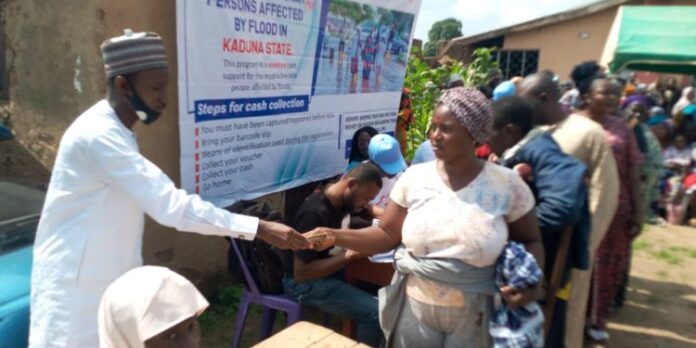The United Nations Children’s Fund (UNICEF) and the Nigeria Red Cross, have disbursed a total sum of N175m to 5,000 households in three local government areas of Kaduna State as part of measures to mitigate flooding in 2022 raining season.
The 5,000 households, who had been affected by flood along the Bank of Kaduna River in the last 10 years, were handed the sum of N35,000 each to help them prepare for an anticipated flood as the water level of the River increases.
Beneficiaries of the cash transfer, under the Shock Responsive Social Protection (SRSP) project in Kaduna State, who were selected from six flood-prone communities of Narayi, Romi, Nasarawa, Kigo, Bashama and Kabala West in Chikun, Kaduna North and Kaduna South LGAs respectively, had their properties and farms destroyed by flood within the period under review.
The breakdown of beneficiaries for each community is as follow: Abubakar Kigo Road 1000; Kabala West 796; Bashama Road 807; Nassarawa 792; Romi 794, and Narayi 811, making a total of 5,000 households.
The SRSP is a pilot programme of UNICEF country office in Nigeria, International Federation of Red Cross (IFRC), and the Nigerian Red Cross with European Community Humanitarian Aid Office (ECHO) funding, in cooperation with the Red Cross affiliated Climate Center based in the Hague, Netherlands.
It would be recalled that the Nigerian Red Cross, between May and June 2022, pre-identified the 5,000 households, meeting the climate vulnerability criteria according to a community targeting approach based on five (5) selection criteria, that is; pregnant and breastfeeding women; (women-headed households), children aged 0-5, (child-headed households), people with disabilities (sight, hearing, walking, intellectual impediment, e.g. amnesia, etc.) and the elderly (from 60 years of age) multidimensional poverty (based on income and assets).
The purpose of the cash support was to enable vulnerable communities to have adequate financial resources to mitigate and respond to the effects of floods, thereby minimising losses and reducing protection risks.
Studies have found that assistance provided prior to the climate-related shock event lasts longer.
The early action and cash transfer prior to floods will enable affected households to mitigate the impact of predicted floods in terms of maintaining and increasing food consumption; securing shelters; protecting assets; ensuring access to jerrycans, as well as to clean water, water purification solutions to avoid waterborne disease, and access to health-related provisions (medicines, transport for health facilities).
The objective is to avoid negative coping mechanisms, such as borrowing, exchanging sex for food or/and other necessities.
Addressing the crowd of beneficiaries at various payment locations, Sunday Awulu, Kaduna State Coordinator of Red Cross, cautioned them not to use the money for any thing outside what it is meant for.
“This money is not meant for wedding ceremonies or buying expensive clothes or for organizing parties, not be shared with anyone, but strictly for you to mitigate the impact of the anticipated floods before they happen.
“Use it to establish small businesses, settle issues concerning your houses, erosion, clear your drainages. Use this money to really help yourself to address some of these areas so that when subsequent flood come, it go a long way for you to cope. let’s begin to intervene in advance so that when it happens, the impact of it will be minimal,” Awulu added.
For her part, UNICEF Emergency Programme Specialist, Lucia Jofrice, urged the beneficiaries to prepare themselves adequately before and after the floods, which is anticipated to come before the end of August, by gathering all their important documents in leather bags and keep them handy.
She advised the farmers to harvest their crops, store food and move to higher ground when they hear or notice that the water level is rising.
She asked them to remember to carry children, the sick, the old and persons with disabilities as they move to safety, adding that they should move to a safe places when they hear or notice an impending flood and that they should not walk on roads and bridges covered with water.
Jofrice also cautioned them to be very careful when returning to their houses after a flood as it may still not be safe, but should ensure they verify information on floods from local authorities.
The beneficiaries on their part thanked UNICEF and Red Cross for the humanitarian gesture, saying their hopes have been rekindled, promising they will use the funds judiciously.


